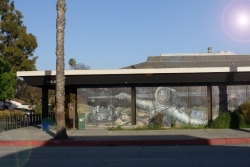A Los Angeles judge finalized his ruling this week, refusing to dismiss a lawsuit in which Ashton Kutcher’s television company alleges the state reneged on an agreement for a Department of Motor Vehicles reality show. Culver City’s DMV location was to be featured.
Superior Court Judge Michael Johnson adopted the tentative decision he issued Friday. The complaint alleges causes of action for breach-of-contract and promissory estoppel. Promissory estoppel prevents one side from breaking a promise, if the other party has reasonably relied on it.
The case is scheduled for trial July 8. Attorneys did not offer arguments at the hearing.
Kutcher’s lawyer, Michael Weinsten, referred calls for comments to Kutchers’ publicist, Kathleen Flaherty, who did not respond immediately to an email request.
A second company working with Katalyst Media, Soda and Pop Inc., also is suing the state.
Katalyst Media and Soda and Pop maintain the DMV broke a May 2011 agreement to allow the firms access to field offices to produce a half- hour reality show. The suit was filed last June 19.
Attorneys for the state asked for the lawsuit to be dismissed, saying the agreement lacked essential terms, such as when filming would begin and which field offices would be featured.
But Johnson said in a written ruling that Kutcher’s lawyers allege that the DMV later agreed to the specifics.
“These subsequent agreements may be construed with the original agreement,” Johnson wrote.
Johnson also wrote that although the state maintains the companies did not obtain a film permit to produce the programs, the plaintiffs’ lawyers “have alleged in general language that they have complied with all necessary conditions to their agreement.”
Lawyers for the companies stated in their court papers that the agreement with the state allowed the clients access to all but the downtown Los Angeles, Compton and Inglewood field offices.
The locations in Montebello, Van Nuys, Santa Monica, Torrance and Culver City were to be featured first, the plaintiffs’ lawyers maintained.
A deputy attorney general wrote the companies in December 2011 saying “the proposed project does not directly serve the public interest or carry out DMV’s mission,” the plaintiffs’ lawyers state in their court papers.













